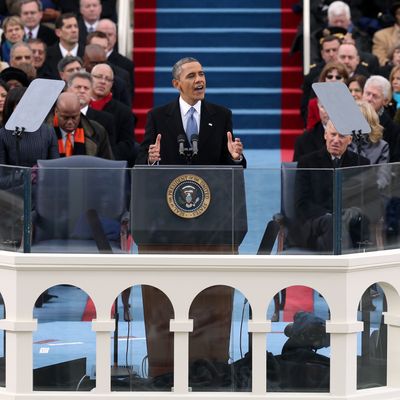
It’s not hard to be patriotic on Inauguration Day. Even if your guy lost the presidential election, even if you’re really, really upset about drones, we’re all winners today: Our rickety Constitution and the nebulous promise of democracy lived to execute another peaceful transfer of power (or not, in this case), no military coups required. It’s not nothing! But this year, there were even more reasons to get a little choked up when Kelly Clarkson — herself a product of America’s democratic spirit, in a way, kind of — belted out “My Country, ‘Tis of Thee.”
Namely, a lot of groups of people historically excluded from American politics were represented in today’s festivities. President Obama became the first president to use the word gay in an inaugural address, when he said that our journey to realize the Declaration of Independence’s mission statement would not be “complete until our gay brothers and sisters are treated like anyone else under the law.” He later situated gay rights — by way of the Stonewall riots — in an American civil rights tradition with Seneca Falls, the birthplace of women’s suffrage, and Selma, the Alabama town where state troopers attacked a civil rights demonstration in 1965, urging his opponents to think historically. “Progress does not compel us to settle centuries-long debates about the role of government for all time,” he said, “but it does require us to act in our time.”
Richard Blanco was the first Latino and the first openly gay poet to recite at a presidential inauguration.
Myrlie Evers-Williams, widow of Medgar Evers, was the first woman and the first layperson to deliver the inaugural invocation, “America’s most prominent public prayer.”
Supreme Court Justice Sonia Sotomayor, who swore in Vice-President Joe Biden, was the first Hispanic to administer an oath of office.




